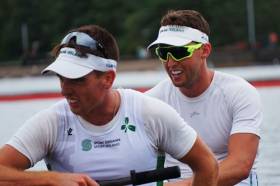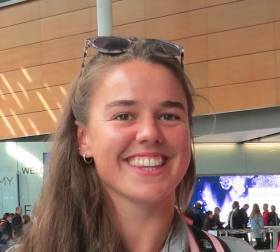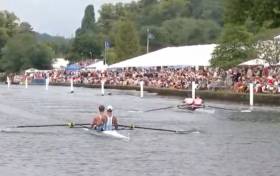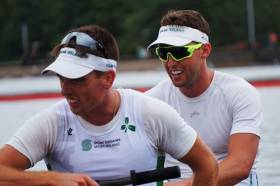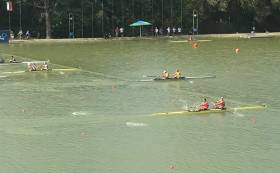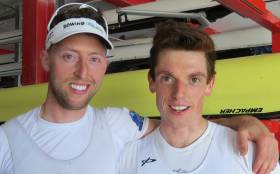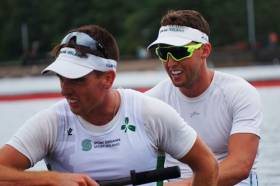Displaying items by tag: Mark O'Donovan
O'Driscoll and O'Donovan End Campaign on a Winning Note
#Rowing: The men's pair of Mark O'Donovan and Shane O'Driscoll won their E Final at the World Rowing Championships in Linz-Ottensheim. The Skibbereen men led right through and saw off nearest challengers, Lithuania.
World Rowing Championships, Linz-Ottensheim, Austria - Day Five (Irish interest)
Men
Pair - E Final (Places 25 to 28): 1 Ireland (M O'Donovan, S O'Driscoll) 6:36.3
Lightweight Double Sculls - A/B Semi-Final Two (First Three to A Final; rest to B Final): 1 Ireland (F McCarthy, P O'Donovan) 6:13.46, 2 Germany 6:13.59, 3 Norway 6:14.15.
Lightweight Single Sculls A/B Semi-Final One (First Three to A Final; rest to B Final): 6 Ireland (G O'Donovan) 7:34.01.
Women
Four A/B Semi-Final Two (First Three to A Final; rest to B Final): 1 Australia 6:25.34, 2 Denmark 6:28.58, 3 Romania 6:30.96; 4 Ireland (T Hanlon, E Lambe, A Keogh, E Hegarty) 6:32.37.
Pair - A/B Semi-Final One (First Three to A Final; rest to B Final): 1 New Zealand 6:57.92, 2 United States 7:01.78, 3 Italy 7:01.80; 4 Ireland (A Crowley, M Dukarska) 7:03.05.
Lightweight Double Sculls - C/D Semi-Final One (First Three to C Final; rest to D Final): 3 Ireland (A Casey, D Walsh) 7:01.68.
Lightweight Single Sculls A/B Semi-Final One (First Three to A Final; rest to B Final): 6 Ireland (L Heaphy) 7:42.23.
#Rowing: The Ireland pair of Mark O’Donovan and Shane O’Driscoll just missed out on a qualifying for the quarter-finals at the World Rowing Championships in Austria today.
The Skibbereen men had to be in the top two in their repechage, but in a three-boat finish, Chile pipped Greece and Ireland were just .66 of a second off qualifying. They go to the E Final.
The lightweight quadruple of Hugh Sutton, Miles Taylor, Ryan Ballantine and Jake McCarthy finished fourth in their heat and will compete in a repechage as they attempt to make the A Final. Italy were very strong and won well, staying clear of Denmark and Austria. Italy qualified for the A Final.
World Rowing Championships, Linz, Austria, Day Two (Irish interest)
Men
Pair - Repechage Two (First Two to Quarter-Finals; Third to Final E): 1 Chile 6:43.70, 2 Greece 6:43.71; 3 Ireland (M O’Donovan, S O’Driscoll) 6:44.35.
Lightweight Quadruple – Heat One (Winner to A Final; rest to Repechage): 4 Ireland (H Sutton, M Taylor, R Ballantine, J McCarthy) 6:04.84
Women's Pair Straight Through but O'Donovan and O'Driscoll Must Go Again at World Championships
#Rowing: Monika Dukarska and Aileen Crowley took an encouraging second place in their heat as they qualified for the quarter finals in the women’s pair at the World Rowing Championships in Linz, Austria. The United States looked to have the win wrapped up, but Ireland raced to the line and pushed them at the finish.
Mark O’Donovan and Shane O’Driscoll finished sixth in their heat of the men’s pair. They were not in the mix for the top-four placing which would have seen them directly into the quarter-finals, and must compete in a repechage.
World Rowing Championships, Linz, Austria, Day One (Irish interest)
Men
Pair – Heat One (First Four to Quarter-Finals; rest to Repechage):
6 Ireland (M O’Donovan, S O’Driscoll) 6:50.51.
Women
Pair – Heat Four (First Four to Quarter-Finals; rest to Repechage):
2 Ireland (A Crowley, M Dukarska) 7:13.30
#Rowing: Mark O’Donovan and Shane O’Driscoll made their exit at the semi-final stage at Henley Royal Regatta today. The Skibbereen pair in the Silver Goblets moved off the start well and took a small lead, but they could not shake off Agustin Diaz and Axel Haack of Argentina.
With each stroke through the middle of the course, the Argentina pair gained traction. The drew level and then passed O’Donovan and O’Driscoll. They opened a big lead and won well.
Henley Royal Regatta, Day Four (Selected Results; Irish interest)
Silver Goblets (Men’s Pairs, Open): A Diaz and A Haack bt M O’Donovan and S O’Driscoll (Skibbereen) 2¾ l
#Rowing: Skibbereen men Mark O’Donovan and Shane O’Driscoll won their first race at Henley Royal Regatta. The Skibbereen pair eased into Saturday’s draw in the Silver Goblets by beating Hugo Elworthy and Harry Hogan with little drama. O’Donovan and O’Driscoll used their very fast start to leave the Doncaster crew behind and then took advantage of the very good conditions to stay clear while easing their rate down.
Henley Royal Regatta, Day Three (Selected Results; Irish interest)
Hambleden Pairs (Women’s Pairs, Open): G Prendergast, K Gowler bt S O’Connor, N Long 2¼ l
Silver Goblets (Men’s Pairs, Open): Mark O’Donovan and Shane O’Driscoll (Skibbereen) bt H Hogan and H Elworthy 2¼ l
Double Sculls (Men’s Double, Open): J Collins, G Thomas bt Nathan Hull and OJ Dix (Queen’s, Belfast and Leander) 1l
O'Driscoll and O'Donovan to Compete at Henley Royal Regatta
#Rowing: The standout names in the Irish entry for Henley Royal Regatta are Mark O’Donovan and Shane O’Driscoll. The world lightweight champions of 2017 have entered the Silver Goblets for open pairs.
The Irish challenge features Commercial in the Thames Cup for club eights and UCD’s four in the Visitors. Both crews are Irish champions. Enniskillen have chosen to enter quadruples in the Fawley and the Diamond Jubilee.
UCD, who compete at Henley Women’s Regatta this weekend, have entered the open event for women’s eights, the Remenham. Orla Hayes of Skibbereen has entered the Princess Royal, the open event for women's single scullers.
Henley Royal Regatta, July 3rd to 7th (Selection of Entries, Irish interest)
Remenham Cup (Women’s Eights, Open): UCD
Thames (Men’s Eight, Club): Commercial
Visitors (Men’s Four, Club and University): UCD
Prince of Wales (Men’s Quadruple, Club and University): Lagan Scullers’
Fawley (Men’s Quadruple, Junior): Enniskillen Royal Boat Club
Diamond Jubilee Cup (Women’s Quadruple, Junior): Enniskillen Royal Boat Club
Britannia (Men’s Fours, coxed, Club): Belfast Rowing Club
Silver Goblets (Men’s Pairs, Open): Mark O’Donovan and Shane O’Driscoll (Skibbereen)
Hambleden Pairs (Women’s Pairs, Open): Sadhbh O’Connor and Natalie Long (NUIG and Skibbereen)
Double Sculls (Men’s Double, Open): Nathan Hull and OJ Dix (Queen’s, Belfast and Leander)
Stonor Trophy (Women’s Double Sculls, Open): Fiona Chestnutt, CK Knight (Reading Univ and Newcastle Univ)
Diamond Sculls (Men’s Single, Open): Callum McCrae (Cambridge Univ Lightweight RC)
Princess Royal (Women’s Single, Open): Orla Hayes (Skibbereen)
Casey and Walsh Finish World Championships With C Final Win
#Rowing: Ireland’s Aoife Casey and Denise Walsh showed the Skibbereen skill for sprinting to good effect as they worn their C Final of the women’s lightweight double sculls at the World Championships in Plovdiv. They were fourth at 500 metres, but they sped up the rankings through the middle 1,000 and led with 500 metres to go. They took it home from there, with Austria second and Germany third. Ireland placed 13th in the World because of this result.
Shane O’Driscoll and Mark O’Donovan took fourth in their C Final, 16th overall, in the men’s pair. The race was won by Australia’s Andrew Judge and Joseph O’Brien, while O’Donovan and O’Driscoll produced a remarkable change of pace to challenge the leaders, but Poland and the United States had pushed in between them and the leaders on the line.
World Rowing Championships, Plovdiv, Bulgaria, Day Seven (Irish interest):
Men
Pair – C Final (places 13 to 18): 1 Australia 6:23.81; 4 Ireland (M O’Donovan, S O’Driscoll) 6:29.19.
Lightweight Double Sculls – A Final: 1 Ireland (G O’Donovan, P O’Donovan) 6:06.81, 2 Italy 6:08.31, 3 Belgium 6:11.25.
Women
Pair – A Final: 1 Canada 6:50.67, 2 New Zealand 6:52.96, 3 Spain 7:04.60; 6 Ireland (A Keogh, E Hegarty) 7:15.70.
Lightweight Double Sculls – C Final (places 13 to 18): 1 Ireland (A Casey, D Walsh) 7:05.77, 2 Austria 7:08.29, 3 Germany 7:09.12.
O'Driscoll and O'Donovan Go Through in Extraordinary Finish at World Rowing Championships
#Rowing: Mark O’Donovan and Shane O’Driscoll featured in the closest race of the day at the World Rowing Championships. The first three crews to finish in the C/D semi-final of the men’s pair would go through to the C Final. O’Donovan and O’Driscoll pushed hard to catch Australia and held second as the crews dashed for the line. But Italy and the Netherlands sped into the picture. The finish was so close that it was well into the next race before the judges ruled that Ireland and Italy had finished joint second (a very unusual decision). The Netherlands missed out by .04 of a second and go to the D Final.
World Rowing Championships, Plovdiv, Bulgaria, Day Five (Irish interest)
Men
Pair – Quarter-Final Four (Three to A/B Semi-Finals; rest to C/D Semi-Finals): 1 Canada 6:26.04, 2 New Zealand 6:30.36, 3 Czech Republic 6:35.01; 5 Ireland (M O’Donovan, S O’Driscoll) 6:44.28. C/D Semi-Final One (Three to C Final; rest to D Final): 1 Australia 6:36.82, 2= Ireland 6:38.74, 2= Italy 6:38.74; 4 The Netherlands 6:38.78.
Double Sculls – Repechage Four (First Two to A/B Semi-Final): Ireland (P Doyle, R Byrne) 6:16.96, 2 Bulgaria 6:20.15.
Lightweight Double – Semi-Final Two (Three to A Final; rest to B Final): 1 Italy 6:21.94, 2 Belgium 6:22.83, 3 Ireland (G O’Donovan, P O’Donovan) 6:23.78.
Women
Pair – Semi-Final (Three to A Final; rest to B Final): 1 Ireland (A Keogh, E Hegarty) 7:14.67, 2 Italy 7:14.99, 3 Spain 7:15.30.
Lightweight Double Sculls – C/D Semi-Final (First Two to C Final; rest to D Final): 1 Ireland (A Casey, D Walsh) 7:20.51, 2 Spain 7:24.08.
O'Donovan and O'Driscoll Fifth in Quarter-Final at World Championships
#Rowing: Shane O’Driscoll and Mark O’Donovan took fifth in their quarter-final of the pair at the World Rowing Championships in Plovdiv. Canada won well, with New Zealand and the Czech Republic taking the other A/B semi-final places. The Ireland crew battled well to push ahead of Denmark, but third and qualification for the A/B Semi-Finals was beyond them. They will compete in the C/D Semi-Finals.
Earlier, Philip Doyle and Ronan Byrne had won their repechage of the double sculls to secure their place in the A/B Semi-Finals.
World Rowing Championships, Plovdiv, Bulgaria, Day Five (Irish interest)
Men
Pair – Quarter-Final Four (Three to A/B Semi-Finals; rest to C/D Semi-Finals): 1 Canada 6:26.04, 2 New Zealand 6:30.36, 3 Czech Republic 6:35.01; 5 Ireland (M O’Donovan, S O’Driscoll) 6:44.28.
Double Sculls – Repechage Four (First Two to A/B Semi-Final):
Ireland (P Doyle, R Byrne) 6:16.96, 2 Bulgaria 6:20.15.
O'Driscoll and O'Donovan Book Place in World Championship Quarter-Final
#Rowing: Mark O’Donovan and Shane O’Driscoll qualified for the quarter-finals of the men’s pair with a second-place finish in their repechage at the World Rowing Championships. Sander de Graaf and Vincent Klaassens of the Netherlands won, with the Ireland pair, their only rivals for the top spot, finishing well and closing on them at the finish, where they were just 1.61 seconds down. Four of the five crews took quarter-final places, with Brazil taking third and Argentina losing out in the final sprint to Bulgaria for the final spot.
World Rowing Championships, Plovdiv, Bulgaria, Day Two (Irish interest)
Men
Pair – Repechage (Four to Quarter-Finals): The Netherlands 6:34.68 2 Ireland (M O’Donovan, S O’Driscoll) 6:36.29, 3 Brazil 6:41.66, 4 Bulgaria 6:42.81.
Lightweight Quadruple Sculls – Heat Two (First to A Final; rest to Repechage): 1 Italy 5:48.03; 3 Ireland (F McCarthy, R Ballantine, J McCarthy, A Goff) 5:53.43.
Women
Double Sculls – Heat One (First Two to A/B Semi-Final; rest to Repechage): 1 Canada 6:54.02, 2 Netherlands 6:55.57; 6 Ireland (M Dukarska, A Crowley) 7:08.79.
Single Sculls – Heat One (Winner to A/B Semi-Finals; rest to Repechage): 1 Ireland (S Puspure) 7:25.78; 2 Denmark 7:39.93.


























